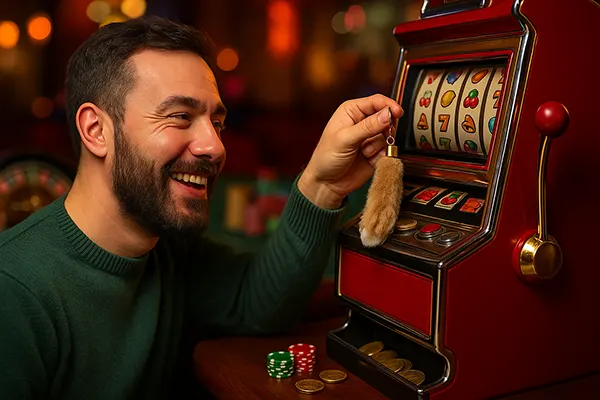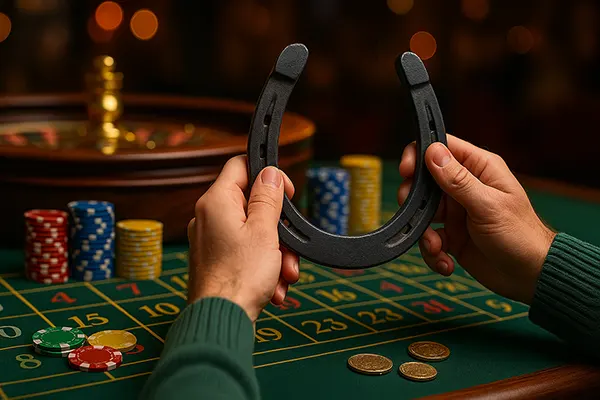Top 10 Unbelievable Player Superstitions You Won’t Believe Exist

Gamblers have always been known for their rituals and strange habits. From avoiding certain colours to performing little gestures before spinning a slot, superstition remains a curious part of gaming culture. While science tells us that luck is purely random, many players still rely on old beliefs to feel more confident in their choices. Below, we explore ten of the most remarkable superstitions that continue to influence players today — and why humour might be the best way to handle them.
Common Superstitions at the Gaming Table
One of the most widespread beliefs is that crossing your legs during play blocks your luck. Many experienced gamblers will uncross their legs immediately if they notice it, convinced that this simple act can change their fortune. While there’s no evidence to support it, the habit persists in casinos across Europe and Asia alike.
Another classic superstition involves lucky charms — rabbit’s feet, coins, or even old tickets from previous wins. Players often carry these trinkets as reminders of past success, subconsciously linking their comfort to a sense of control. Psychologists suggest that such rituals can reduce anxiety, even if they don’t influence the game itself.
Some players also refuse to sit at a table where someone has just lost heavily. They believe the “bad energy” lingers and could affect the next round. Interestingly, this belief dates back centuries when early gamblers thought misfortune could be contagious — a sign of how deeply tradition shapes gaming habits.
Origins of These Traditions
Most gambling superstitions originated from cultural practices long before modern casinos appeared. In ancient China, players believed that washing hands before a game washed away luck, while in Europe, people avoided playing cards on Sundays to prevent “tempting fate.” These customs evolved over generations and blended into gambling folklore.
With the globalisation of gambling in the 20th century, many traditions began to mix. A Danish player’s “lucky red shirt” might have the same symbolic meaning as an Italian gambler’s silver bracelet. Today, these rituals form a universal language of luck — one that transcends borders and beliefs.
Despite the lack of logic behind these ideas, they survive because they give people a sense of agency. When chance decides the outcome, even small actions like tapping a machine three times can create a comforting illusion of control.
Modern Superstitions in Online Gaming
Even though online gambling removes physical elements like dice or cards, superstitions have adapted to the digital environment. Players might refresh their browser three times before logging in or only play after midnight, believing that certain hours bring better luck. It’s an updated version of ancient rituals dressed in modern behaviour.
Some players avoid using specific numbers when depositing funds, especially those they associate with misfortune, such as 13 or 666. Conversely, others choose combinations they view as lucky, like 7 or 8, depending on their cultural background. These small acts demonstrate how symbolic thinking persists even in a data-driven world.
Another curious trend involves players who refuse to switch devices if they’ve recently won. If a lucky streak happens on a smartphone, they’ll continue using it rather than move to a laptop, convinced that changing hardware might “break the flow.” It’s proof that human psychology finds patterns even where none exist.
Psychological Role of Superstition
From a psychological standpoint, superstition helps people manage uncertainty. Games of chance are unpredictable, and rituals offer emotional comfort. Researchers from the University of Cambridge have found that performing such actions can reduce stress and make players feel more in control, even when outcomes are random.
Humour plays a surprisingly important role in this dynamic. Laughing at one’s own rituals — like whispering to the screen before a spin — allows players to detach from the illusion of control. This self-awareness prevents frustration and helps maintain a healthy relationship with gambling.
Ultimately, superstitions show that gaming isn’t only about winning or losing; it’s about the human desire to make sense of randomness. Understanding this can encourage more responsible and mindful play.

Why People Still Believe in Luck
Belief in luck often reflects a deeper human need for hope. Life itself is full of unpredictable moments, and gambling amplifies that uncertainty. Many players treat luck as a form of comfort — something to rely on when skill and strategy reach their limits.
Superstitions can also build community. Shared habits, like touching the table before a spin or wishing others good fortune, create social bonds among players. These actions might not influence probability, but they strengthen camaraderie and enjoyment, turning gaming into a more emotional experience.
Finally, the persistence of gambling folklore shows that people love stories as much as they love numbers. Tales of lucky socks, forbidden seats, and “cursed” machines continue to circulate because they make the experience more memorable. In that sense, superstition adds character to the game — a blend of myth and psychology that keeps the excitement alive.
Rational Thinking and Responsible Play
Recognising superstition for what it is — a harmless ritual rather than a source of luck — is essential for responsible play. Awareness allows players to enjoy the thrill without being controlled by irrational beliefs. It turns superstition into part of the fun rather than a decision-making rule.
Educators and responsible gaming organisations now use humour and storytelling to address these topics. By showing how absurd some rituals can be, they encourage players to focus on probability, strategy, and self-control instead of magical thinking. This approach has proven effective in promoting safer gaming habits worldwide.
In 2025, with the growing popularity of responsible gambling campaigns, superstition remains a fascinating cultural phenomenon — one that reveals much about human nature, imagination, and the eternal search for luck.
